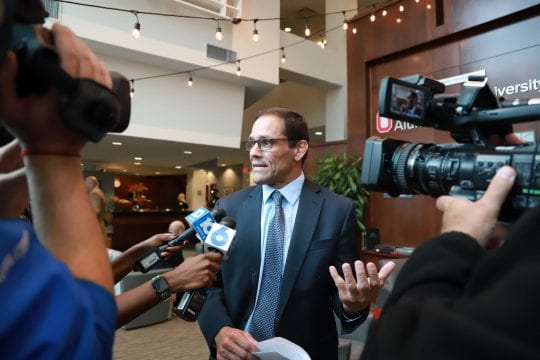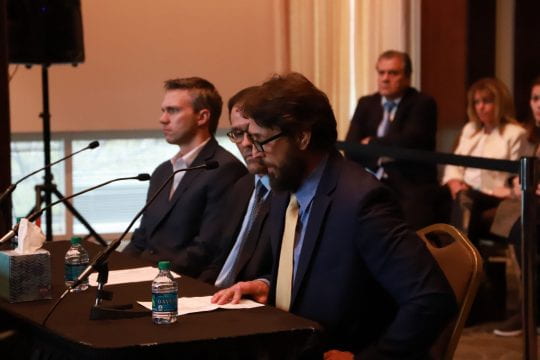Mike Schyck, a survivor of former Ohio State physician Richard Strauss, sat silent before the Board of Trustees at Thursday’s full Board meeting for 20 seconds dense with emotion.
Schyck had been imploring the Board to “do the right thing,” telling it, “You have the power.”
He said he hadn’t gone to the media prior to his statement at the same meeting in 2018, thinking that speaking to the Board first would be the best way to help the university.
Strauss was a team doctor for 17 men’s varsity sports and a physician at the Student Wellness Center at Ohio State from 1978-98, during which he abused at least 177 students and student-athletes, according to a report released in May following an investigation conducted by Perkins Coie, LLP. The investigation also found that Ohio State failed to act on Strauss’ abuse at the time.
Ohio State’s latest count, according to a university press release, includes nearly 1,500 instances of Strauss-related abuse. Fourteen Strauss-related lawsuits have been filed against the university.
Strauss died by suicide in 2005.
After a pause to collect himself and some reassurance from the two other victims there to speak, Dan Ritchie and Brian Garrett, Schyck continued.
“I bleed scarlet and gray. The best time of my life was to wrestle for the Buckeyes,” Schyck said. “I know you guys got the new Covelli Center. They just had the first dual meet here, and I want to be part of that. Since this has all come out two years ago, I feel like I’m not a victim. I was the problem.”
Schyck and the other two survivors there to make statements said they feel more like liabilities to Ohio State than victims and called for accountability from the university.
Prior to their statements, Board Chairman Gary Heminger and University President Michael V. Drake addressed the victims.
“We are grateful for your willingness to speak before this Board, and we remain thankful to those of you who shared your experiences with us last November,” Heminger said. “I want to reiterate that we are dedicated to a fair outcome. To be clear, this means that Ohio State is committed to monetary resolution.”
Heminger said university efforts to assist Strauss survivors have included taking the lead on the investigation, acknowledging the abuse, providing counseling resources for victims and their families and the establishing of a sexual abuse task force.
Heminger added that the Board of Trustees was there to listen to survivors, but could not engage in dialogue because of ongoing litigation.
Ohio State currently faces more than a dozen lawsuits related to Strauss’ abuse. Some are in the mediation process, but no agreement has been reached.
Drake said the abuse was “reprehensible,” and called the university’s failure to act “inexcusable,” echoing Herminger’s sentiments.
“Once the limitations of legal process have been removed, this university looks forward very much to creating future opportunities to engage directly with survivors in pursuit of a restorative justice model,” Drake said.
Ritchie, the first of the three victims to speak, said he finds trouble understanding why Strauss wasn’t dealt with during his employment and openly debated whether the allegations would have been taken seriously if the victims were women.
“People have asked why we didn’t say anything back then, when these abuses were going on. The fact is we did,” Ritchie said. “We openly complained about the abuses and the actions of Dr. Strauss and the deviant culture within Larkins Hall, where we practiced and showered. It was reported, but nothing was ever done to rectify the problems, so the abuses continued.”
Ritchie and Schyck mentioned that going through the process of holding the university accountable has reopened wounds related to Strauss’ abuse.
“You revisit something that was not so good back then, and now we’re revisiting it in a different way and dealing with that burden day in and day out,” Schyck said. “You just want it to end. What’s the way of doing that? That’s why we’re here.”
Ohio lawmakers are beginning to call for Ohio State to do the right thing too, Schyck said, including Gov. Mike DeWine and House Speaker Larry Householder.
Garrett said that, although the university is providing free counseling to survivors, he has not been contacted by the university to be reimbursed for his own counseling, and those services were not provided until February 2019, after Strauss’ abuse came to light.
What also upset him was the university’s statements regarding the allegations.
“To be honest with you, President Drake, I am glad you’re leaving,” Garrett said. “Because I don’t know if I can stomach another public comment that’s brought up by your PR people.”
Drake announced Thursday morning that he would be retiring from his position in 2020 and moving to a faculty position.
Garrett said he was particularly displeased with the way Drake’s statements were phrased, and how the president referred to Ohio State as the university of decades past.
The victims are still determining exactly what the “right thing” is, but said much of it deals with the university taking actions that reflect its words.
“We’re still talking. We don’t know what that means yet,” Ritchie said. “A lot of it has to do with the university, but I think ultimately it’s accountability.”
Garrett said a university can’t be held accountable the same way a student is held accountable by failing them when they cheat on a test or an employee accountable by firing them; in this instance, the only way to hold Ohio State accountable is through money.
“That’s the way it’s set up,” Garrett said. “We have to put a dent in them, prevent them from doing other things, put more toward the football [team], whatever it is.”
Regardless, Garrett said he will continue to fight, show up at Board meetings and do whatever it takes for the university to do right by the survivors.
“Look at my wife and my son. [Board member] Brent [Porteus] knows them. They’re the ones that have to deal with all of the stuff that goes on at home. [Ritchie] has the same thing, and [Schyck] has the same thing as us,” Garrett said. “Don’t look at me. Look at them. My mom’s back there. Look at them, and you tell them that you’re not gonna do the right thing.”
A previous version of this story misspelled Mike Schyck’s name. It has since been corrected.













